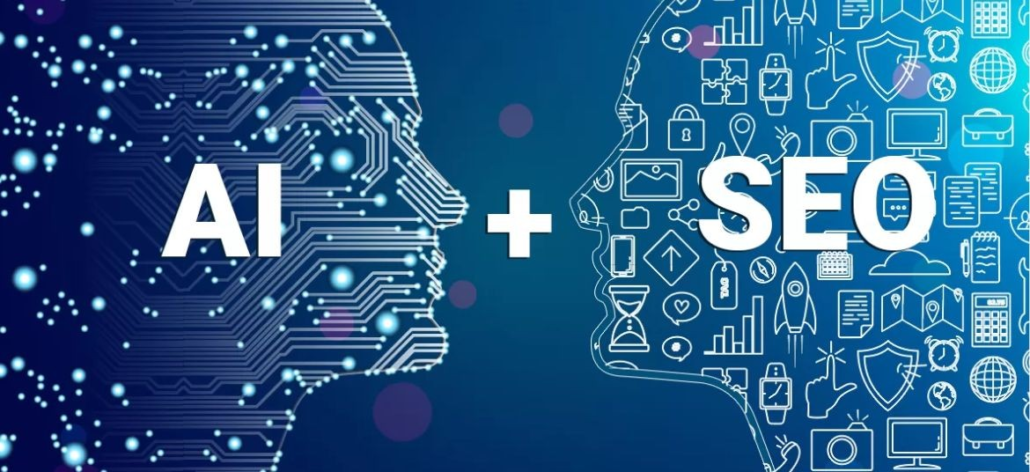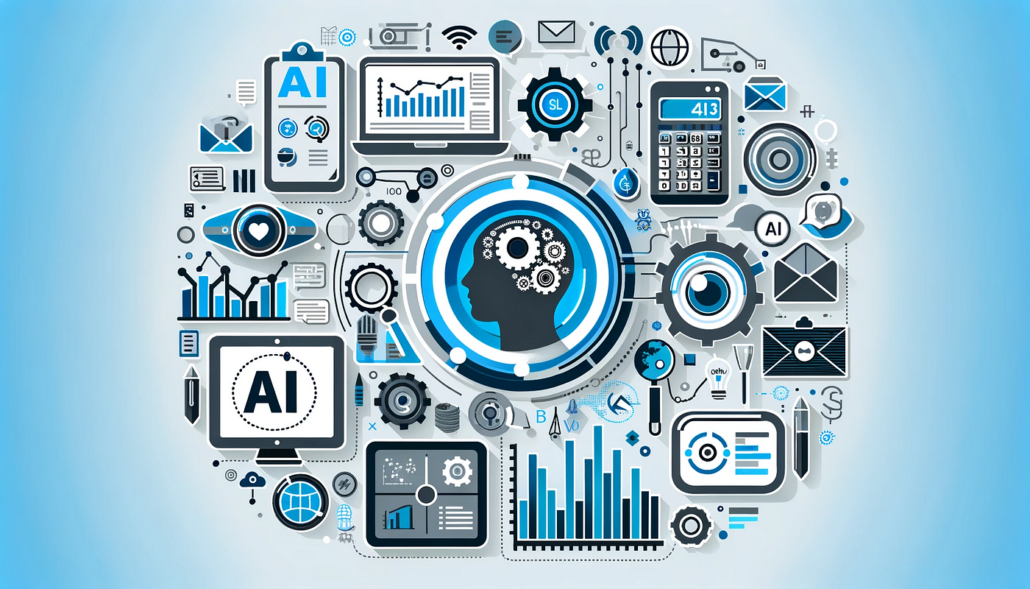ROLE OF AI IN DIGITAL MARKETING

Introduction
In today’s fast-paced digital world, marketing strategies are rapidly evolving. Digital marketing—covering social media, email marketing, and SEO—has become essential for businesses aiming to connect with their audiences effectively.
Artificial Intelligence (AI) is at the forefront of this transformation. By analyzing vast data and generating actionable insights, AI is revolutionizing digital marketing. It enhances customer experiences, optimizes campaigns, and introduces innovative strategies.
Understanding AI’s role in digital marketing is crucial for staying competitive. This blog explores how AI is reshaping digital marketing and what this means for the future.
Understanding AI in Digital Marketing

Artificial Intelligence (AI) is a field in computer science focused on developing systems that can perform tasks typically requiring human intelligence. In digital marketing, AI includes various technologies that can learn from data, recognize patterns, and make decisions with minimal human input. The main types of AI used in digital marketing are:
- Machine Learning (ML): Algorithms that improve automatically through experience. ML is used in marketing for predictive analytics, customer segmentation, and campaign optimization.
- Natural Language Processing (NLP): This technology enables computers to understand, interpret, and generate human language. It powers chatbots, sentiment analysis, and content creation tools.
- Computer Vision: AI that allows computers to interpret and process visual information. It’s used in digital marketing for image recognition, visual search, and augmented reality experiences.
Utilizing these AI technologies helps businesses gain deeper insights into customer behavior, personalize their marketing efforts, and enhance the efficiency of their digital marketing strategies.
Benefits of AI in Digital Marketing

- Enhanced Customer Experience and Personalization: AI allows businesses to deliver highly personalized experiences by analyzing customer data and behavior. This leads to more engaging and relevant customer journeys through personalized recommendations, tailored content, and targeted advertisements.
- Improved Data Analysis and Insights: AI processes and analyzes vast amounts of data much faster and more accurately than humans. This results in deeper insights into customer preferences, market trends, and campaign performance, enabling businesses to make data-driven decisions.
- Increased Efficiency and Automation: AI automates repetitive and time-consuming tasks such as email marketing, social media posting, and ad bidding. This not only saves time and resources but also ensures consistency and accuracy in marketing efforts.
- Cost-Effectiveness and Scalability: By automating tasks and optimizing marketing strategies, AI reduces operational costs and allows businesses to scale their efforts without a proportional increase in resources. AI-driven tools can efficiently manage large volumes of tasks, enabling marketers to focus on strategic activities.
Overall, AI’s ability to enhance customer experience, provide deep insights, increase efficiency, and reduce costs makes it an invaluable asset in digital marketing.
Key applications of AI in Digital Marketing

- Content creation and Curation:
- AI-Driven Content Creation: Tools like GPT-4 can generate blog posts, articles, and social media content, saving time and ensuring consistency
- Personalized Content Recommendations: AI analyzes user behavior to suggest relevant content, enhancing user engagement and retention.
- Customer Insights and predictive analysis:
- Behavior Analysis: AI examines customer data to identify patterns and preferences, enabling targeted marketing strategies.
- Predictive Analytics: AI forecasts future trends and customer actions, allowing businesses to proactively tailor their campaigns.
- Chatbots and Virtual assistants:
- Enhanced Customer Service: AI-powered chatbots provide instant responses and support, improving customer satisfaction.
- 24/7 Availability: Virtual assistants ensure continuous customer engagement, handling queries and issues round-the-clock.
- Email Marketing Automation
- Personalized Emails: AI customizes email content and timing based on viewer’s behavior and preferences.
- Performance Optimization: AI conducts A/B testing and analyzes email campaigns to optimize performance and increase conversion rates.
- Social Media Management:
- Automated Posting: AI schedules and publishes social media content, ensuring consistency and optimal timing.
- Sentiment Analysis: AI monitors and analyzes social media interactions to gauge public sentiment and inform marketing strategies.
- Ad Targeting and Programmatic Advertising:
- AI-Powered Ad Placement: AI automates ad placement and bidding, targeting the right audience at the right time.
- Real-Time Optimization: AI continuously analyzes ad performance, making real-time adjustments to maximize ROI.

AI’s applications in digital marketing—ranging from content creation and customer insights to chatbots, email automation, social media management, and ad targeting—are transforming how businesses connect with and engage their audiences.
Challenges and Ethical Considerations

- Issue: Collecting and handling large amounts of user data brings up serious privacy and security concerns. There’s always a risk of data breaches and misuse.
- Solutions: To address these issues, it’s crucial to use strong encryption, follow data protection laws like GDPR, and maintain strong cybersecurity practices.
2. The Need for Transparency and Fairness in AI Algorithms
- Issue: AI algorithms can be complex and hard to understand, making it difficult to see how decisions are made. This can result in biases and unfair outcomes.
- Solutions: To improve transparency, we should focus on creating explainable AI models and regularly auditing these systems to ensure they are fair.
3. The Potential for Job Displacement and the Future of Work
- Issue: The rise of automation and AI could lead to job losses, especially for roles that involve repetitive tasks. This calls for efforts to reskill workers and adapt to the changing job market.
- Solutions: Investing in training programs, promoting continuous learning, and developing new job roles that make use of AI technology can help address these challenges.
Future Trends in AI and Digital Marketing

- The Rise of AI-Powered Voice Search and Smart Assistants
- Trend: Voice search is becoming more popular with smart assistants like Siri, Alexa, and Google Assistant. This change means businesses need to adjust their SEO strategies to cater to voice searches.
- Implications: To improve voice search results, content should be designed to match natural, conversational language and include longer, more specific keywords.
2. The Growing Importance of Visual and Video Content
- Trend: Visual and video content is increasingly important in digital marketing. AI tools are helping to create, personalize, and target this type of content more effectively.
- Implications: Marketers should focus on producing high-quality visual and video content and use AI to enhance targeting and engagement with their audience.
3. The Impact of AI on SEO and Search Engine Algorithms
- Trend: AI is playing a bigger role in shaping SEO and search engine algorithms, making them more advanced in understanding and ranking content.
- Implications: Keeping up with the latest AI-driven SEO techniques and adjusting to changes in search algorithms is essential for maintaining good search rankings.
4. Emerging AI Technologies and Their Potential Applications
- Trend: New AI technologies, including advanced machine learning models and generative AI, are constantly emerging.
- Implications: Businesses should explore and experiment with these new technologies to find creative ways to boost growth and efficiency.

Conclusion
Artificial Intelligence is fundamentally reshaping digital marketing, driving innovations and efficiencies that were once unimaginable. By enhancing customer experiences through personalization, optimizing data analysis, and automating tasks, AI is revolutionizing how businesses engage with their audiences.
The rise of AI-powered voice search, the growing importance of visual content, and the continuous evolution of AI technologies highlight the need for businesses to stay agile and informed. Embracing AI not only helps in staying competitive but also opens doors to new opportunities for growth and success in the digital landscape.


Leave a Reply
Want to join the discussion?Feel free to contribute!